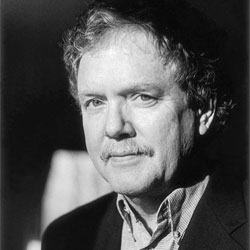All the preachers claiming it was Satan–
And now the first sets seem more venerable
Than Abraham or Williamsburg
Or the avant-garde, but then nothing,
Not even the bomb, had ever looked so new,
So it seemed almost heretical watching it
When we visited relatives in the city,
Secretly delighting, but saying later,
After church, probably it would not last,
It would destroy things: the standards,
And the sacredness of words in books.
So it was well into the age of color,
And Korea and Little Rock long past,
Before anyone got one, and then some
Of them in the next valley had one,
And you would know them by their lights
Burning late at night, and the recentness
And distance of events entering their talk,
But not one in our valley; for a long time
No one had one, so when the first one
Arrived in the van from the furniture store
And the men had set the box on the lawn,
At first we stood back from it, circling it
As they raised the antenna and staked in
The guy wires before taking it in the door,
And I seem to recall a kind of blue light
Flickering from inside and then a woman
Calling out that they had got it tuned in–
A little fuzzy, a ghost picture, but something
That would stay with us, the way we hurried
Down the dirt road, the stars, the silence,
Then everyone disappearing into the houses.
Notes on the Poem
What challenges does a poem take on when it deals with subject matter with a perhaps limited shelf life? At the same time, what interesting opportunities do references that were part of a popular culture at the time of writing, but gone increasingly obscure to later readers, open up - symbolically, thematically or otherwise? Television sets were novel items in the late 1940s, but rapidly became a recognized part of more and more American households throughout the 1950s. When Rodney Jones' poem "TV" was first published in the mid-1990s, it treated the advent of the soon-to-be-pervasive device as something thrilling: "Not even the bomb, had ever looked so new, So it seemed almost heretical watching it When we visited relatives in the city, Secretly delighting" but also quaint, framing the concerns, resistance and fascination from a perspective firmly decades past: "All the preachers claiming it was Satan--" and "then a woman Calling out that they had got it tuned in--" But by the time this same poem was collected in Jones' 2006 "Salvation Blues: One Hundred Poems, 1985-2005", so much more has changed technologically and culturally that the poem itself might seem quaint to some readers. At very least, some googling of "Korea" or "Little Rock" or "antenna guy wires" might be in order. But does it matter? You can find countless comparable examples in the realm of poetry from not just decades, but centuries ago. For every reference from ages past that the reader might not understand, a poem can and will serve up something as pertinent and timeless, unattached to specific references and reference points, as: "the way we hurried Down the dirt road, the stars, the silence, Then everyone disappearing into the houses."
